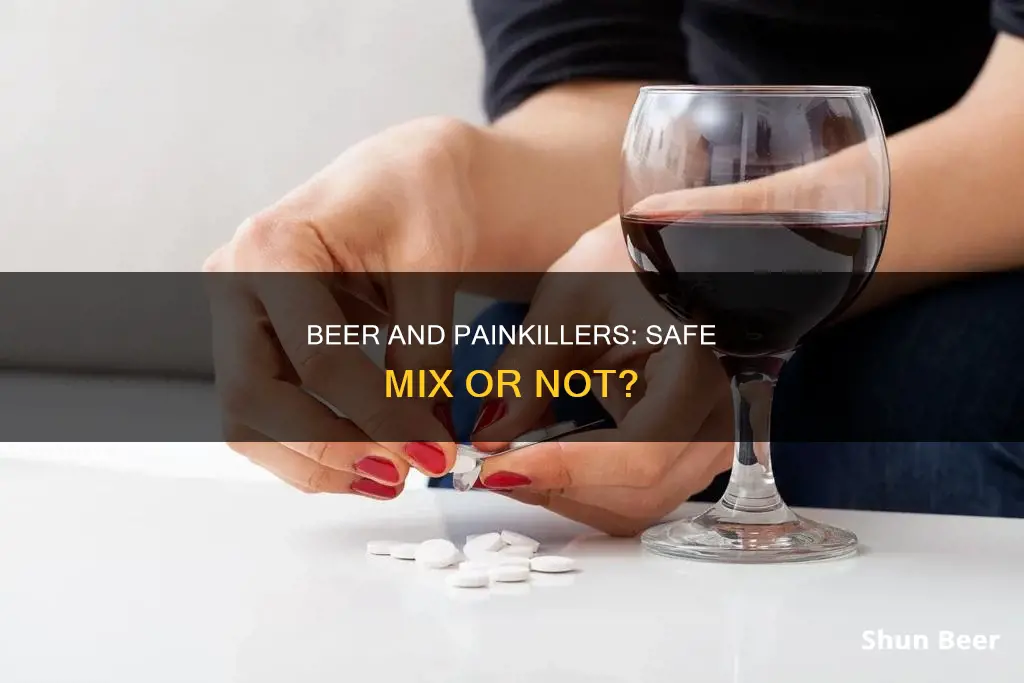
Drinking alcohol and taking painkillers is generally not advised, as it can lead to serious adverse reactions, including organ damage, loss of consciousness, and even death. Alcohol can interfere with some drugs, making them less effective, and intensify their side effects. While a small amount of alcohol with certain painkillers may be safe, regularly mixing the two can be harmful and may cause gastrointestinal bleeding, liver damage, kidney problems, and increased drowsiness.
| Characteristics | Values |
|---|---|
| Is it safe to mix painkillers and alcohol? | Generally not advised, can lead to severe health problems |
| Painkillers and alcohol side effects | Headaches, nausea, vomiting, drowsiness, fainting, loss of coordination, difficulty breathing, internal bleeding, heart problems |
| Ibuprofen and alcohol | Can irritate the stomach and intestine lining, may experience serious side effects when drinking heavily |
| Acetaminophen and alcohol | Can lead to irreversible liver damage |
| Naproxen sodium and alcohol | Safe when consuming alcohol, but carries a risk of stomach bleeding |
| Aspirin and alcohol | Can cause stomach bleeding, increases blood alcohol levels |
| Prescription painkillers and alcohol | Can be deadly, increases the risk of an opioid overdose |
What You'll Learn
- Ibuprofen and alcohol can irritate the stomach and intestine lining, increasing the risk of ulcers and bleeding
- Acetaminophen and alcohol can cause irreversible liver damage
- Naproxen sodium and alcohol can cause stomach bleeding
- Aspirin and alcohol can increase the risk of internal bleeding, stroke, or kidney failure
- Prescription opioid painkillers and alcohol can cause serious breathing impairment, decreased oxygen in the blood, coma, and even death

Ibuprofen and alcohol can irritate the stomach and intestine lining, increasing the risk of ulcers and bleeding
Ibuprofen is a medication designed to relieve pain, swelling, and fever. It is available over the counter under brand names such as Advil, Midol, and Motrin. While taking ibuprofen with alcohol occasionally is typically not a cause for concern, doing so regularly can have adverse effects on the body.
Ibuprofen can irritate the lining of the stomach and intestine, and so can alcohol. When taken together, they increase the risk of ulcers and bleeding in the stomach and intestine. A study of 1,224 participants showed that regular ibuprofen use raised the risk of gastrointestinal bleeding in people who consumed alcohol. People who drank alcohol but only used ibuprofen occasionally did not have this increased risk.
Ibuprofen can also cause gastric or intestinal perforation, which can be fatal. The risk of stomach bleeding is greater for people over 60 years of age, those who take high dosages or use the drug long-term, those who take blood-thinning drugs or steroid drugs, and those who have had stomach bleeding problems in the past.
To reduce the risk of stomach upset when taking ibuprofen with alcohol, it is recommended to eat a snack or small meal and switch to drinking water.
Alcohol-Free Beer and Metronidazole: Is It Safe?
You may want to see also

Acetaminophen and alcohol can cause irreversible liver damage
Acetaminophen, also known as paracetamol, is a widely used nonprescription analgesic and antipyretic medication for mild-to-moderate pain and fever. It is typically recommended for the management of minor aches and pains from the common cold, viral and bacterial infections, sinusitis, headache, toothache, back ache, muscle strain, tendonitis, osteoarthritis, trauma, or menstrual cramps. It is usually safe when taken in therapeutic doses, but it can cause severe liver damage when taken in large doses or mixed with alcohol.
Acetaminophen has a direct hepatotoxic effect when taken in overdose, and can cause acute liver injury and even death from acute liver failure. Even in therapeutic doses, acetaminophen can cause transient serum aminotransferase elevations. The risk of liver damage is increased when acetaminophen is combined with alcohol, as alcohol increases the metabolism of acetaminophen through the cytochrome P450 system, leading to the accumulation of toxic intermediates that can bind to and damage liver cells.
To avoid the risk of liver damage, it is important to follow the recommended dosage for acetaminophen and to avoid consuming alcohol while taking this medication. If you have any concerns or questions about the safe use of acetaminophen, it is best to consult with your healthcare provider or pharmacist.
Beer and Breastfeeding: Is It Safe?
You may want to see also

Naproxen sodium and alcohol can cause stomach bleeding
Naproxen sodium is a non-steroidal anti-inflammatory drug (NSAID) that is used to treat inflammation, pain, and fever. It is generally safe to consume alcohol while taking naproxen, as long as it is done in moderation. However, drinking large quantities of alcohol while taking naproxen can lead to some unwanted side effects.
Naproxen, like other NSAIDs, can cause an ulcer in the stomach or gut if taken for a long time or in large doses. Alcohol can also increase the volume of acid in the stomach, leading to irritation and soreness. When combined, naproxen and alcohol can put individuals at a heightened risk of gastritis, an inflammation of the stomach lining that can cause discomfort. In addition, both substances can increase the risk of stomach bleeding, especially in older individuals or those with a history of stomach problems.
To minimise the risks associated with mixing naproxen and alcohol, it is important to follow the recommended dosage and duration of naproxen use. It is also crucial to drink alcohol in moderation, typically no more than three standard drinks per day. If you have a history of stomach ulcers, bleeding, or other problems, it is important to consult your doctor before mixing naproxen and alcohol.
The combination of alcohol and pain medication can have severe consequences. Alcohol can interfere with the effectiveness of medication and intensify side effects. It can also increase the risk of organ damage, loss of consciousness, and even death. Therefore, it is always advisable to consult a healthcare provider or pharmacist about the potential interactions between alcohol and any medication you are taking.
Spinal Tap Procedure: Beer Drinking and Recovery Time
You may want to see also

Aspirin and alcohol can increase the risk of internal bleeding, stroke, or kidney failure
Combining alcohol with painkillers is a potentially life-threatening combination. Alcohol is a dangerous substance on its own, and when mixed with medication, it can have harmful interactions. Even a single social drink could put your health at risk.
Aspirin is a popular over-the-counter pain reliever that many people take for headaches, toothaches, joint and muscle pain, and inflammation. It is also available by prescription for those with chronic coronary artery disease or to reduce the chance of stroke in those who have had a transient ischemic attack or an ischemic stroke.
Aspirin, when taken with alcohol, can increase the risk of internal bleeding, stroke, or kidney failure. Mixing the two can also cause gastrointestinal distress, including nausea and vomiting. It can also cause or worsen ulcers, heartburn, or stomach upset. These side effects are usually not serious but can cause extreme discomfort.
In some cases, especially when a person takes more than the recommended dose of aspirin and drinks more than the recommended amount of alcohol, such bleeding can be life-threatening. Alcohol increases blood pressure, and aspirin is a blood thinner, so you may experience prolonged gastrointestinal bleeding. The more alcohol you drink, the thinner your blood becomes, which can lead to significant bleeding.
Both aspirin and alcohol also put stress on the liver independently. When combined, they can substantially increase liver damage, which can become permanent and lead to serious health complications and even death.
To minimize the risk of complications, it is best to avoid drinking alcohol when taking aspirin. If you plan on drinking in the evening, take your aspirin in the morning to minimize the effects. However, it is always best to consult your doctor or pharmacist for specific instructions on alcohol consumption and medication management.
Drinking Beer on Siesta Key Beach: What's Allowed?
You may want to see also

Prescription opioid painkillers and alcohol can cause serious breathing impairment, decreased oxygen in the blood, coma, and even death
Combining prescription opioid painkillers with alcohol can have severe and dangerous consequences. Both opioids and alcohol are central nervous system depressants, which means they slow down bodily functions. When taken together, they can cause respiratory depression, leading to shallow or stopped breathing. This reduction in breathing can cause a person's heart rate and oxygen levels to plummet, increasing the risk of slipping into a coma. In some cases, this lack of oxygen to the brain can result in brain damage, organ failure, or even death.
A 2017 study found that taking even one tablet of an opioid such as oxycodone with a modest amount of alcohol can significantly increase the risk of respiratory depression. This effect is even more pronounced in elderly individuals. When a person combines alcohol with opioids, their breathing rate may slow to the point where their brain does not receive enough oxygen, leading to organ shutdown and, eventually, coma or death.
The combination of alcohol and opioids can also lead to other harmful side effects, including irregular heart rate, changes in blood pressure, loss of coordination, and extreme lack of inhibition. These side effects can further increase the risk of accidents or injury. Additionally, the synergistic effect of combining opioids and alcohol can enhance the euphoric "high" feeling, increasing the potential for misuse and addiction.
The dangers of mixing alcohol and prescription opioid painkillers are significant, and it is crucial to take warning labels seriously. Abstaining from alcohol while taking prescription opioids is the best way to avoid serious health risks. Even a single social drink can put an individual's health at risk. Consulting with a doctor or pharmacist is essential for specific instructions on alcohol consumption and medication management.
Beer Drop: How Does the Subscription Work?
You may want to see also
Frequently asked questions
It depends on the type of pain reliever. It is generally advised to avoid drinking alcohol while taking painkillers, as it can lead to severe health problems and even death. However, having a small amount of alcohol with certain over-the-counter painkillers like ibuprofen is usually safe if you follow the recommended dosage.
Mixing painkillers and alcohol can cause a range of adverse reactions, including organ damage, loss of consciousness, and death. Alcohol can also enhance the effects of prescription opioids, leading to a higher risk of overdose. In addition, both alcohol and painkillers can cause harm to the liver, kidneys, heart, brain, and pancreas.
Ibuprofen (Advil, Motrin) and naproxen sodium (Aleve) are generally considered safe to take with a small amount of alcohol if used as directed and for a short period. However, they can irritate the stomach and increase the risk of gastrointestinal bleeding, especially with regular use or when combined with alcohol.
Acetaminophen is metabolized by the liver, and combining it with alcohol can lead to irreversible liver damage. Acetaminophen use, with or without alcohol, is the leading cause of acute liver failure in the United States. Therefore, it is crucial to consult a doctor before mixing these substances.







